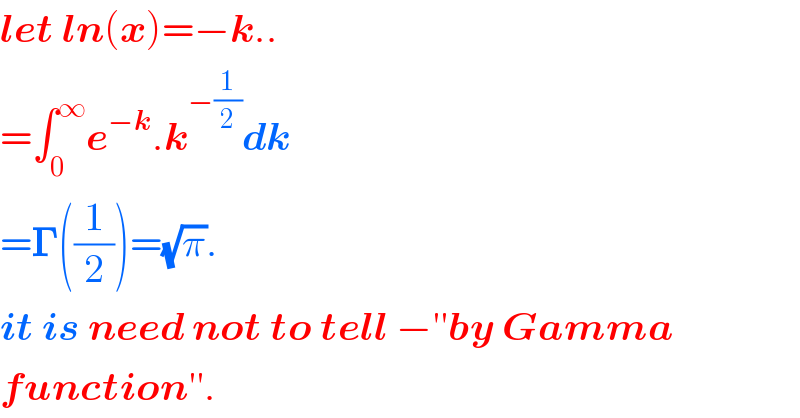
Question Number 97057 by bemath last updated on 06/Jun/20
![∫_0 ^1 (dx/(√(−ln(x)))) ? [ by Gamma function ]](Q97057.png)
$$\underset{\mathrm{0}} {\overset{\mathrm{1}} {\int}}\:\frac{{dx}}{\sqrt{−\mathrm{ln}\left({x}\right)}}\:?\:\left[\:{by}\:{G}\mathrm{amma}\:\mathrm{function}\:\right] \\ $$
Answered by Sourav mridha last updated on 06/Jun/20

$$\boldsymbol{{let}}\:\boldsymbol{{ln}}\left(\boldsymbol{{x}}\right)=−\boldsymbol{{k}}.. \\ $$$$=\int_{\mathrm{0}} ^{\infty} \boldsymbol{{e}}^{−\boldsymbol{{k}}} .\boldsymbol{{k}}^{−\frac{\mathrm{1}}{\mathrm{2}}} \boldsymbol{{dk}} \\ $$$$=\boldsymbol{\Gamma}\left(\frac{\mathrm{1}}{\mathrm{2}}\right)=\sqrt{\pi}. \\ $$$$\boldsymbol{{it}}\:\boldsymbol{{is}}\:\boldsymbol{{need}}\:\boldsymbol{{not}}\:\boldsymbol{{to}}\:\boldsymbol{{tell}}\:−''\boldsymbol{{by}}\:\boldsymbol{{Gamma}}\: \\ $$$$\boldsymbol{{function}}''. \\ $$
Commented by bemath last updated on 06/Jun/20

$$\mathrm{yes}.\:\mathrm{thanks} \\ $$
Answered by mathmax by abdo last updated on 06/Jun/20

$$\mathrm{I}\:=\int_{\mathrm{0}} ^{\mathrm{1}} \:\frac{\mathrm{dx}}{\sqrt{−\mathrm{lnx}}}\:\mathrm{changement}\:\sqrt{−\mathrm{lnx}}=\mathrm{t}\:\mathrm{give}\:−\mathrm{lnx}\:=\mathrm{t}^{\mathrm{2}} \:\Rightarrow\mathrm{lnx}\:=−\mathrm{t}^{\mathrm{2}} \:\Rightarrow\mathrm{x}\:=\mathrm{e}^{−\mathrm{t}^{\mathrm{2}} } \\ $$$$\mathrm{I}\:=−\int_{\mathrm{0}} ^{\infty} \:\:\:\frac{−\mathrm{2t}\:\mathrm{e}^{−\mathrm{t}^{\mathrm{2}} } }{\mathrm{t}}\:\mathrm{dt}\:=\mathrm{2}\:\int_{\mathrm{0}} ^{\infty} \:\mathrm{e}^{−\mathrm{t}^{\mathrm{2}} } \mathrm{dt}\:=\mathrm{2}×\frac{\sqrt{\pi}}{\mathrm{2}}\:=\sqrt{\pi} \\ $$
